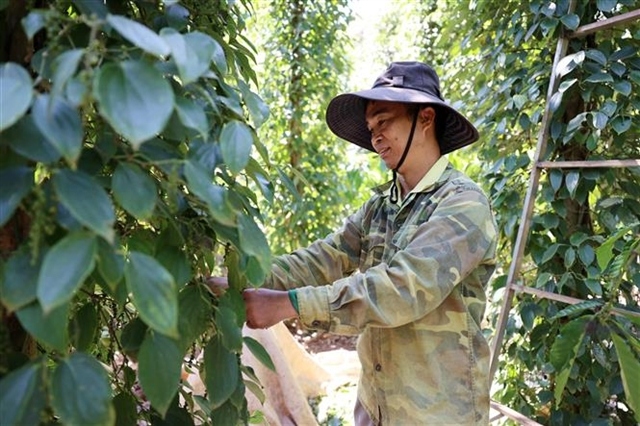Pepper is on track to return to the group of billion-dollar export items
The Vietnam Pepper and Spice Association (VPSA) forecasts that Vietnam's pepper exports this year will reach over US$1 billion, returning pepper to the group of billion-dollar commodities.
According to the VPSA, by July 30, Vietnam exported 164,357 tonnes of various types of pepper. Of the total, exports of black pepper accounted for 145,330 tonnes and those of white pepper reached 19,027 tonnes.
The total export turnover reached US$764.2 million. With the results achieved and with five months remaining of the year, pepper is on track to return to the billion-dollar mark.
Compared to the same period in 2023, the export volume of pepper decreased by 2.2%, but the export turnover increased by 40.8%. The average export price of black pepper in the first seven months reached US$4,568 per tonne, while that of white pepper reached US$6,195 per tonne, up 32.7% and 25% respectively, year-on-year.
The US is the largest export market for Vietnamese pepper, followed by Germany (up 97.3%), the UAE (up 39.2%) and India (up 39.7%). China ranks fourth with exports decreasing 84.6% compared to the same period.
According to VPSA, the rise in Vietnam's pepper exports is due to the scarcity of global pepper supply.
Brazil is currently the world's second-largest producer and exporter of black pepper after Vietnam, accounting for 17% to 18% of the global supply. The continuous crop failures in Brazil are expected to have a global ripple effect, driving global pepper prices higher in the last months of 2024 when pepper supply from other major producing countries, including Vietnam, Malaysia and Indonesia, also declines significantly.
Currently, the global pepper supply is being constrained due to the impact of El Nino. In the long term, over the next three to five years, pepper production will be insufficient to satisfy worldwide demand.
Price hikes were also seen in the domestic market. In July, domestic pepper prices reached VND150,000 per kg, up 82.9% compared to January and up 120.6% from the same period in 2023. On average, black pepper prices have risen 66.5% over the first seven months compared to the same period in 2023.
According to the VPSA, the pepper market is facing numerous challenges and prices are expected to continue fluctuating shortly.
Hoang Phuoc Binh, Vice Chairman of the Chu Se Pepper Association in Gia Lai Province, said producers should recognise the start of a new price increase cycle. This cycle is expected to last about ten years.
A survey conducted by the VPSA in early July across three Central Highlands provinces revealed that pepper cultivation and production are increasingly being challenged by competition from durian and coffee crops. New planting areas have been recorded but remain limited and are mainly intercropping pepper with coffee.
The impact of El Nino climate change at the beginning of the year has continuously impacted farmers' pepper cultivation and maintenance. This was followed by La Niña, which has further unsettled farmers, especially at a time when durian and coffee prices are high, making pepper cultivation less attractive for replanting on a large scale.
Through a survey of key pepper-growing areas of Vietnam, including three Central Highlands provinces (Gia Lai, Dak Lak and Dak Nong) and three Southeast provinces (Binh Phuoc, Dong Nai and Ba Ria-Vung Tau), Binh assessed that the area assigned to pepper cultivation has decreased by up to 50% compared to its peak.


